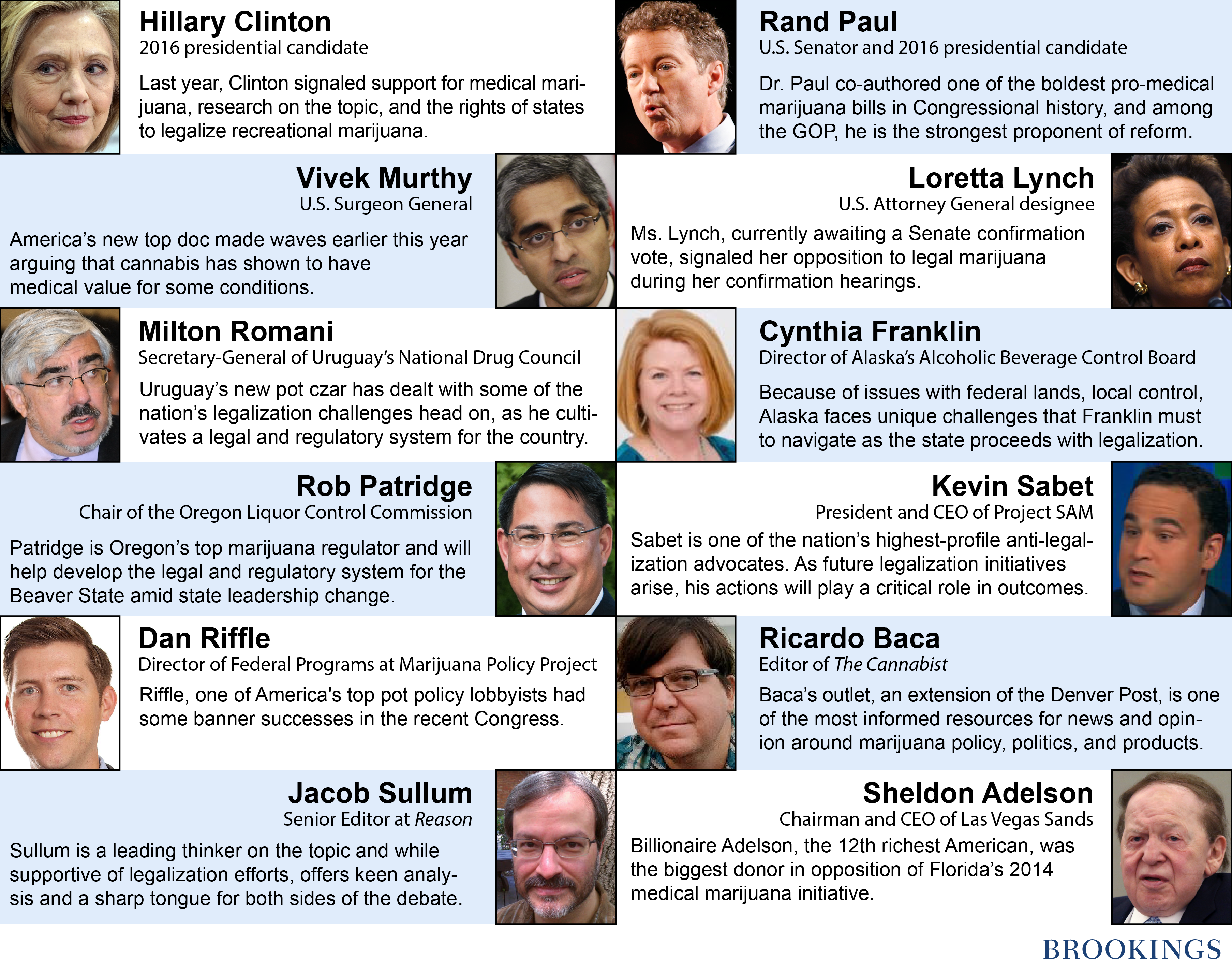Marijuana policy has emerged as a key issue in American politics, particularly over the past few years. The issue is being debated at local, state, and federal levels, and has captured the attention of media organizations and research institutions nationwide and around the world.
Navigating the policy terrain and understanding what is happening in this fast-paced, dynamic, and changing arena is often tough. Knowing who is influential can be even more difficult. Because of the expansive nature of the policy conversation there are hundreds of key players making a difference—on both sides of this issue—and that list is seemingly ever growing.
In this post, I list 12 people who each bring something interesting to the table and may play an important role in the future of this policy area. They may not be the most important, though surely some of the people on this list could be considered so. Nor is this list ranked in order of importance or impact. Instead, it offers a brief overview of how these 12 individuals may help shape the future of cannabis policy.

1. Hillary Clinton, 2016 Presidential Candidate
The presumptive Democratic nominee will help (re-)shape her party’s position on pot policy. Given the popularity of marijuana among Democrats, and the likelihood that the issue will appear on 2016 ballots in key swing states, her position and rhetoric on the issue will be an important part of the conversation. It is a topic Secretary Clinton likely cannot ignore, and one she may be well-positioned to embrace, given changing public opinion.
In an interview with CNN last year, Clinton signaled support for medical marijuana, research on the topic, and the rights of states to legalize recreational marijuana. She said, “…I think we need to be very clear about the benefits of marijuana use for medicinal purposes. I don’t think we’ve done enough research yet, although I think for people who are in extreme medical conditions and have anecdotal evidence that it works, there should be availability under appropriate circumstances…. On recreational, you know, states are the laboratories of democracy. We have at least two states that are experimenting with that right now. I want to wait and see what the evidence is.”
This is a far cry from the uncomfortable exchanges her husband had on the issue when he first ran for president in 1992. In many ways, this position suggests Secretary Clinton would be willing to maintain the current status quo (under the Cole Memo). Media, Democratic primary voters, and marijuana policy activists will surely hold her feet to the fire, pushing her to articulate her vision on the issue.
2. Rand Paul, U.S. Senator & 2016 Presidential Candidate
Dr. Paul co-authored the CARERS Act, one of the boldest pro-medical marijuana bills in congressional history. Among GOP contenders, he is the strongest proponent of reform. In the Republican Party he has played a leadership role on marijuana policy, engaging the issue from a variety of perspectives—economic, civil rights, criminal justice. For Paul, marijuana is also a states rights issue. He recently noted, “I think there should be a certain amount of discretion for both states and territories and the District…” He further argued on recreational legalization, “I’m not for having the federal government get involved. I really haven’t taken a stand on … the actual legalization. I haven’t really taken a stand on that, but I’m against the federal government telling them they can’t.”
Many of the declared and prospective 2016 Republican presidential candidates have taken hardline, war on drugs positions on the issue of marijuana. Marijuana policy gives Paul an opportunity to distinguish himself from many of his fellow Republicans. At the same time, he will play an important role in showing his party what marijuana policy can do for them (in the eyes of the electorate) and will likely serve as a model for Republicans (and Democrats) down the ballot on effective ways to talk about marijuana.
However, Dr. Paul’s role in marijuana policy goes beyond his rhetoric. The CARERS Act shows that he is willing to put policy substance behind his words. The legislation shows that marijuana is a topic that high-level, American politicians no longer have to fear, and that it is one that can bridge the partisan divide in an era of bitter, seemingly unbreakable polarization.
3. Vivek Murthy, U.S. Surgeon General
America’s new top doc made waves earlier this year arguing that cannabis has shown to have medical value for some conditions and that he supports expanded research on its medical value and use. Specifically, he noted in a CBS interview that, “for certain medical conditions and symptoms that marijuana can be helpful.” Such a position may not seem odd—the U.S. Surgeon General calling for expanded medical research on a product being utilized for medical purposes. However, those words on medical marijuana were the most progressive, on-the-record comments of a sitting Surgeon General in American history.
Those comments may come with real action, as Dr. Murthy suggested. “We have to use that data to drive policymaking, and I’m very interested to see where that data takes us,” he noted in the same CBS interview. This commentary reflects not simple Dr. Murthy’s view on the topic, but changing views in the medical community that at a minimum entertain the possibility of marijuana’s medical value. Like other high-profile physicians, including CNN’s and Emory University’s Dr. Sanjay Gupta will play a critical leadership role in the medical community in encouraging broader research on the topic and making changes to public policy that facilitates that research.
4. Loretta Lynch, U.S. Attorney General designee
Ms. Lynch, currently awaiting a Senate confirmation vote, signaled her opposition to legal marijuana during her confirmation hearings. Those hearings showed marijuana to be a key issue in contemporary American politics. Senators asked Ms. Lynch about the Justice Department’s current policy on marijuana under the Cole Memo.
When asked if she supported marijuana legalization, Ms. Lynch offered a clear position: “I do not.” She further outlined her vision for marijuana policy if she were to take the helm at DOJ: “I can tell you that not only do I not support legalization of marijuana, it is not the position of the Department of Justice currently to support legalization, nor would it be the position if I were confirmed as attorney general.”
Such language leaves open the possibility that Lynch could still maintain a Cole Memo-status quo, arguing that the Department’s position is not pro-legalization, but simply a choice not to enforce the law under certain circumstances. Yet, one thing is quite clear. Loretta Lynch holds a less reform-oriented position on marijuana than does President Obama or Attorney General Eric Holder. As the nation’s top law enforcement official her influence on the issue will be substantial, and a new Justice Department status quo could be a real possibility.
5. Milton Romani, Secretary-General of Uruguay’s National Drug Council
Uruguay’s pot czar under the new government is charged with cultivating a legal and regulatory system. After legalizing recreational marijuana in 2013, Uruguay has faced a series of challenges from regulatory delays to leadership changes (including the election of a new president, Tavaré Vásquez). Much of this policy turmoil led many to question whether Uruguay was ready for legalization.
Despite those difficulties, Uruguay moved forward. With Romani newly at the helm of the Junta Nacional de Drogas, he will lead the first effort in Latin America to administer a legal recreational marijuana system. Early in his tenure, Romani has dealt with some of the challenges that still exist within the administrative apparatus in Uruguay, including instituting a delay in the sale of cannabis from pharmacies. In addition, recent polling from the Latin American Public Opinion Project suggests legalization is proceeding in the shadow of a very skeptical public. About 60 percent of Uruguayans disagree with the legislation legalizing marijuana.
Other nations are watching closely to see if Uruguay can manage legalization. Worry abounds in other nations and NGOs like the UN about legalizing marijuana in a region of the world synonymous with the illegal drug trade. In addition, many Latin American countries are looking at the Uruguay experiment with intrigue. Uruguay has some of the most stable governing institutions in Latin America, and while success in Uruguay may not translate to success elsewhere, failure may well discourage other nations from legalizing. In this sense, Romani’s efforts will not only influence policy in Uruguay, but may well have implications for marijuana policy across Latin America and in other areas of the world.
6. Cynthia Franklin, Director of Alaska’s Alcoholic Beverage Control Board
Franklin will lead and oversee the construction of Alaska’s marijuana regulatory system. Alaska legalized recreational marijuana in 2014 and the state, among the most conservative and Republican of legalizing states thus far, has a long history of more progressive marijuana policy. The state faces some specific challenges, however. The sheer amount of federal land—on which marijuana remains illegal—is unmatched by any other state. The state also faces very unique local control policies in rural areas. Transportation limitations, natural barriers to commercial exchange and activity, and other issues that make Alaska one of a kind will also make legalization unique, as well.
The state legislature approved the creation of a separate Marijuana Control Board—in which Franklin will play a critical role—instead of keeping marijuana regulatory authority under the Alcoholic Beverage Control Board—which Franklin directs. Under the new law, Franklin will help design and implement marijuana regulations and will influence the success of legal marijuana in the Frontier State through a new institution devoted solely to administering marijuana policy. While Colorado’s and Washington’s experiments may strike some observers as old hat, as each new legalizing state comes online, marijuana policy watchers learn more about the issue. Franklin’s efforts and Alaska’s experience with legal marijuana will help inform future policy making and other states’ interests in proceeding with legalization.
7. Rob Patridge, Chair of the Oregon Liquor Control Commission
Patridge is Oregon’s top marijuana regulator and will help develop the legal and regulatory system for the Beaver State. He has pushed his agency to engage the public heavily during the process. Patridge’s Oregon Liquor Control Commission (OLCC) has organized statewide listening tours, offers transparent online communication systems, and posts official meetings and hearings online in an effort to keep the public informed. In many ways, Patridge and the OLCC have set the standard for public inclusion in post-legalization deliberations around the implementation of recreational marijuana.
Patridge is proceeding with implementation in the face of a few unique challenges. The recent resignation of Governor Kitzhaber and unrelated removal of OLCC’s top marijuana policy advisor have brought added uncertainty to an already difficult policy area. Oregon is also the first legalizing state to share a border with another state with legal marijuana (Washington), and while interstate marijuana commerce remains illegal federally, interstate market pressures—influenced in large part by regulatory choices in each state—can have serious consequences for the legal market. In addition, Patridge will oversee the implementation of recreational marijuana as the state continues with reforms to its existing medical marijuana program—a process that has created concerns in the marijuana patient advocacy community.
Like his colleague in Alaska, Patridge’s efforts in these early days of American legalization will likely have a substantial influence on what future marijuana policy looks like in other states.
8. Kevin Sabet, President & CEO of Project SAM
Sabet is one of the nation’s highest-profile anti-legalization advocates. On this culture war issue, Sabet serves as one of the most effective spokespeople in opposition. Sabet’s background includes working in three different White Houses as a drug policy advisor—the latest stint working in President Obama’s Office of National Drug Control Policy. He offers one of the more robust and articulate alternatives to the growing movement to legalize marijuana across the U.S.
His current posts—at the University of Florida College of Medicine and at SAM (Smart Approaches to Marijuana)—offers him a national perch to influence the conversation around marijuana policy. He founded SAM, a group he leads along with former U.S. Congressman Patrick Kennedy, an organization that opposes recreational marijuana and is skeptical of smoked medical marijuana. However, despite the often black-and-white nature of describing the marijuana debate, Sabet shares some of the same concerns as marijuana legalization advocates on items like criminal justice issues and user vilification.
As future legalization initiatives arise, his actions will play a critical role in the coordination of opposition, messaging around the issue and ultimately outcomes.
9. Dan Riffle, Director of Federal Programs at Marijuana Policy Project
Riffle is one the nation’s leading pro-legalization lobbyists. His recent successes include helping pass the Rohrabacher-Farr amendment restricting DOJ enforcement activity around medical marijuana. As states, voters, and advocates look to Congress to address the patchwork of laws that now compose marijuana policy in the US and deal with myriad problems like banking and medical research, Riffle and other lobbyists like him will be at the forefront of those efforts.
Once seen as an outsider arguing in favor of a taboo, outside-the-mainstream policy, Riffle is now viewed as a serious lobbyist in the halls of Congress, dealing with an issue that is emerging from the shadows and not simply a topic reserved for hushed, off-the-record discussions. As legislators like Rand Paul, Cory Booker, Jared Polis, Earl Blumenauer and others become vocal spokespeople for marijuana policy reform, Riffle and other marijuana lobbyists are the force behind those ideas and proposals.
As Congress gets the sea legs to deal with marijuana policy questions and states continue a variety of policy changes, Riffle and his colleagues like Drug Policy Alliance’s Bill Piper and Marijuana Policy Project’s Director of State Policies, Karen O’Keefe—to name a few—will influence this area of law and public policy.
10. Ricardo Baca, Editor of The Cannabist
Baca’s outlet—an extension of the Denver Post—is one of the most informed resources for news and opinion around marijuana policy, politics, and products. Baca serves in a unique role, the head of America’s first mainstream media organization devoted to covering the marijuana beat. While there are long-standing specialty outlets such as High Times, at The Cannabist Baca has transformed the manner in which mainstream media deals with this new policy issue.
The Cannabist provides a perspective on the issue, for sure, but also maintains high-quality journalistic standards. Other national and local media outlets look to The Cannabist for coverage of marijuana policy in Colorado and elsewhere. Baca has ensured that the outlet not only serves as a clearinghouse for information, but plays a thought leadership role in the pro-marijuana movement. His outlet will have an effect on marijuana policy in the same way media influences conversations on all types of public policy; Baca will also help transform media treatment and coverage of marijuana policy and politics over time.
11. Jacob Sullum, Senior Editor at Reason
Sullum is an award winning and nationally syndicated journalist. From his perch at Reason, he writes on a wide variety of topics that include marijuana policy and politics. His critically acclaimed book Saying Yes: In Defense of Drug Use is Sullum’s most comprehensive look at the topic and reflects his talents in long-form to complement compelling work in short-form journalism.
His work on marijuana examines state-level initiatives and issues as well as policy at the national level. His perspective frequently focuses on individual rights and choice, but he also focuses on how politics and politicians influence and engage the topic. He is one of the leading thinkers on the topic and while broadly supportive of legalization efforts, offers keen, critical analysis and a sharp tongue for both sides of the debate. His work is frequently featured in national level outlets, is cited in other media and research forums, and he often appears on national media outlets discussing the topic. His perspective and writing will influence the future of the debate and discussion on marijuana.
12. Sheldon Adelson, Chairman & CEO of Las Vegas Sands
Adelson, known more for casinos and presidential campaigns, was the biggest donor in opposition of Florida’s 2014 medical marijuana initiative, by some estimates donating 85% of such funds. Adelson sent more than $5 million from Southern Nevada to the Sunshine State to defeat a constitutional amendment that would have legalized medical marijuana. The ballot initiative fell just short of the 60% support needed for passage. It is unclear whether this outsized role in Florida’s medical marijuana campaign was a fluke or a signal that Adelson will become a funding power in opposition to marijuana reform laws.
In 2016, two tests will likely offer insight into what Adelson plans. His homestate—Nevada—will vote on the legalization of recreational marijuana. In addition, efforts are underway for Florida to vote on medical marijuana again. While the demographics of a presidential election year and rapidly changing public opinion on marijuana—especially medical marijuana—may mean Adelson’s goal of maintaining prohibition may be at risk, the spending efforts of the 12th richest American may have a substantial effect on future marijuana ballot initiatives and the organization of groups opposed to legalization.
Update: The updated post features the new head of Uruguay’s National Drug Board, Milton Romani. He recently replaced Julio Calzada under the Vásquez administration.



Commentary
4/20 series: 12 key people to watch in marijuana policy
April 20, 2015